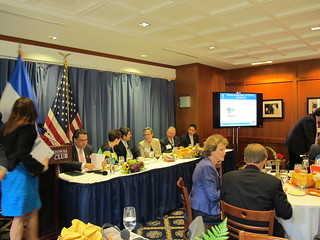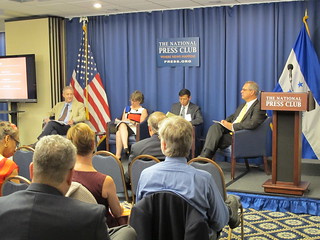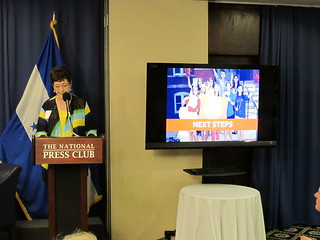University presidents from around the world create Action Agenda to solve hunger
Article body
Inspired at an historic gathering of university presidents from around the world Honduran President Juan Orlando Hernandez said he planned to take the document that they had all signed, Presidents' Commitment to Food and Nutrition Security, to Vice President Joe Biden, saying that this was an action plan that could help solve hunger.
Hernandez spoke on June 17 at the National Press Club gathering of Presidents United to Solve Hunger (PUSH), a movement that has grown in less than a year to nearly 80 universities from six continents.
"I would never forgive myself if I had taken office as president and let slip a number of opportunities such as the one PUSH is offering the world," Hernandez said to a crowd of university and multi-sector leaders as he told them of his commitment to bring hope to the youth of his nation and prevent a repeat of the mass migration that rattled the United States just a year ago.
"That was not an immigration problem," he added. "It was a problem of poverty, of hunger, of hopelessness. He then outlined his plan to invest in his country – especially in poor rural areas to not only revive agriculture with new knowledge and systems – most of which have been developed in universities, but also to put in place resiliency programs to protect the country from climate change risks.
Auburn University President Jay Gogue, who also serves on the PUSH Steering Committee, opened the meeting, saying, "PUSH is currently working on two fronts to develop a global view of university action on all campuses and also assess needs in developing countries."
The meeting also featured a number of well-known champions of fighting hunger including Catherine Bertini, Syracuse University professor of public policy and World Food Prize Laureate, International Food Policy Research Institute Director General Shenggen Fan, Association of Public and Land-grant Universities President Peter McPherson, author and journalist Roger Thurow and Tufts University professor and head of the USAID Nutrition Innovations Lab Patrick Webb. The focus was on defining activities where the collective actions of universities could become a tipping point in solving hunger. Fan discussed PUSH becoming involved in a global effort to collect knowledge and best practices about food and nutrition security issues, called Compact 2025 and the engaged audience shared other opportunities for collaboration.
Bertini offered the most tweeted quote of the event that generated nearly 8 million impressions saying, "Hunger is deplorable but solvable." She offered a six-point plan for the presidents who are poised to organize their campuses saying they needed to lead, choose their mission, organize by defining their area of focus, find allies – on and off campus, build a lasting program to ensure continuity and take advantage of all opportunities to advance the fight against hunger.
PUSH is an outgrowth initiative formed as a result of a meeting at Auburn University in 2014 as a way of getting university presidents worldwide to help universities provide leadership in solving hunger at home and abroad.
Hernandez, knowing he was talking to a group who most likely will never experience hunger, outlined the situation it has created in his native country, where more than 60 percent of the population lives in poverty. He reaffirmed the commitment of his administration to find solutions to hunger and poverty, as well as provide a new hope to the youth of his country who are migrating in the hundreds in search of a better life.
A self-described country boy, Hernandez said he considered hunger to be a solvable issue before he was introduced to Auburn University's efforts at a Universities Fighting World Hunger summit in his native country in 2012. Even then, he knew it was an issue that this generation could solve. He said he believes partnering with PUSH and establishing a Hunger Solutions Institute for Latin America will be key to reaching these goals. Auburn University started its Hunger Solutions Institute in 2012 to leverage Auburn's War on Hunger.
"The global challenges are such that we have a clear choice: are we going to let it happen or are we going to do something about it?" Hernandez asked.
Auburn's College of Human Sciences Dean June Henton listed a number of coming events for PUSH, including a summit Feb. 25-27, 2016 at the University of Missouri-Columbia. Additionally, she asked the presidents to contribute feedback on the first phase of an inventory and mapping initiative which will catalog activities in teaching, research, outreach and student engagement on each campus. This will result in an unprecedented database that will identify new areas of potential collaboration as well as provide each president, a unique view of all existing hunger-related activities.
Related Media
Related Links
Media interested in this story can contact Communications Director Preston Sparks at (334) 844-9999 or preston.sparks@auburn.edu.
Auburn University is a nationally ranked land grant institution recognized for its commitment to world-class scholarship, interdisciplinary research with an elite, top-tier Carnegie R1 classification, life-changing outreach with Carnegie’s Community Engagement designation and an undergraduate education experience second to none. Auburn is home to more than 30,000 students, and its faculty and research partners collaborate to develop and deliver meaningful scholarship, science and technology-based advancements that meet pressing regional, national and global needs. Auburn’s commitment to active student engagement, professional success and public/private partnership drives a growing reputation for outreach and extension that delivers broad economic, health and societal impact.







